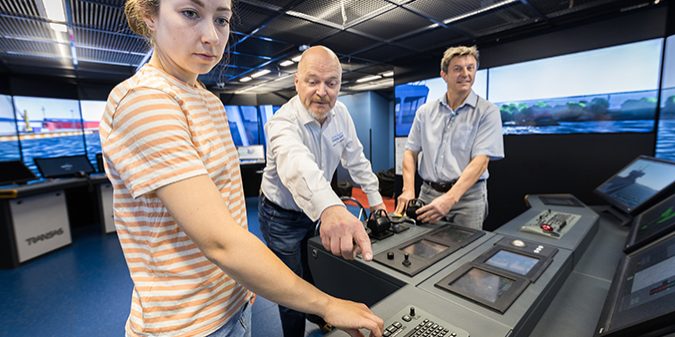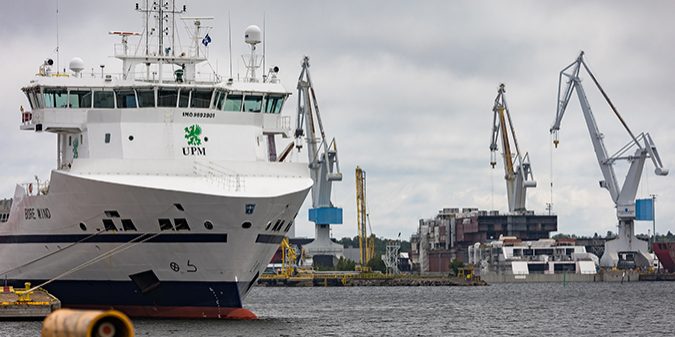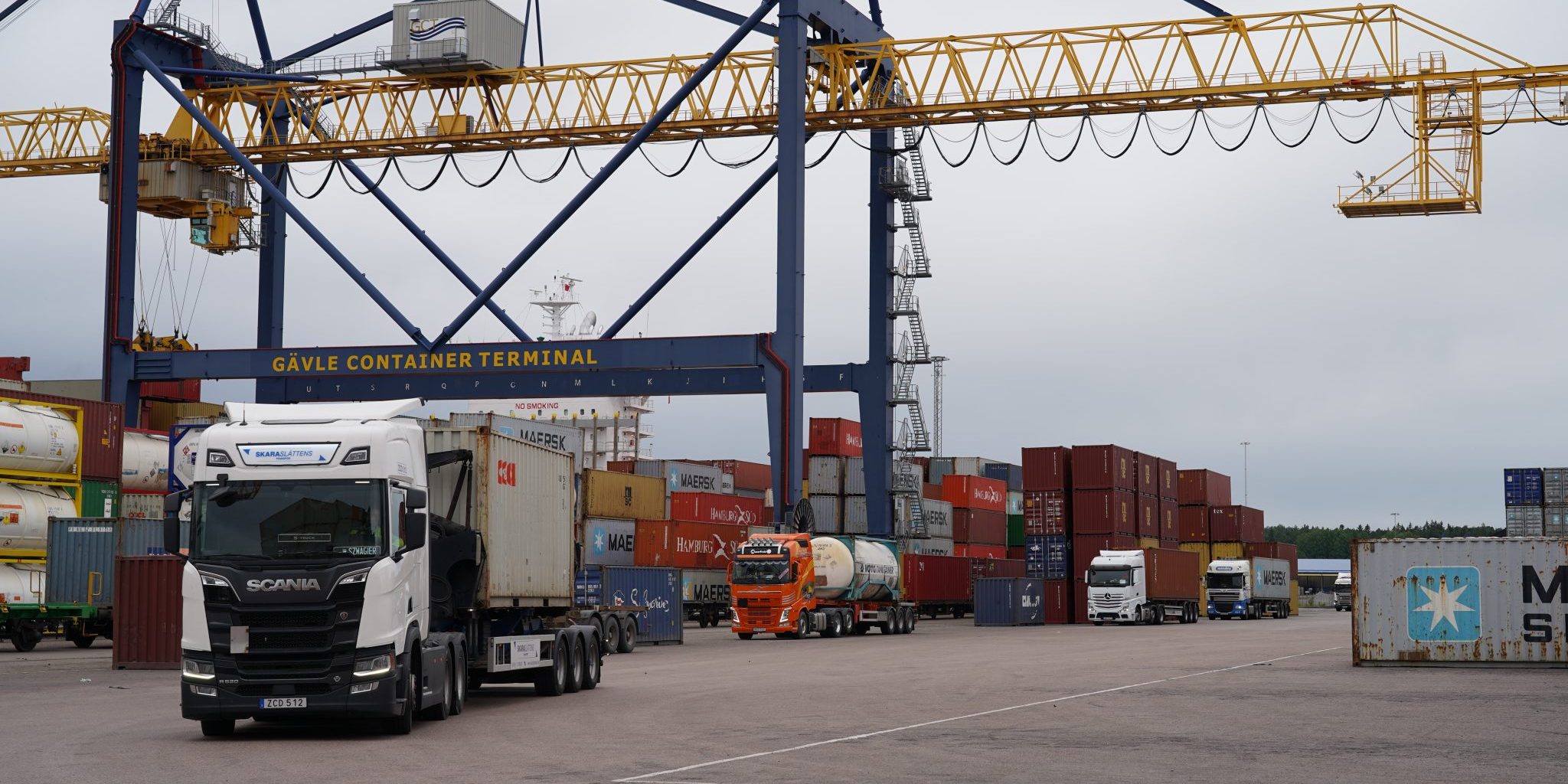Projects of the Maritime Logistics Research Center
The Baltic Sea e-Nav project is dedicated to modernizing the digital navigation tools for maritime navigation, in the Baltic region. To improve not only navigation itself but also efficiency, safety and aiding in elevating the green footprint of our oceans. By unlocking the value of Baltic Sea big data and kickstarting the implementation of cutting-edge S-100 navigational products, we aim to enhance and expand existing data sets. This will provide ships with advanced digital navigation, that will give a more detailed picture of the maritime weather and ocean status, easing the voyage planning and overall navigation.
Transnational cooperation is at the heart of the project, ensuring these new tools are available everywhere, preventing delays, and benefiting all countries around the Baltic Sea despite varying maturity levels. This cooperation is crucial for enhancing shipping efficiency and aligning with the EUSBSR goals for a sustainable blue economy. Our first objective is to empower data producers to generate next-generation navigational products by enhancing their capabilities and upgrading systems to S-100 standards. Secondly, we aim to harmonize these products regionally under the Baltic Sea Hydrographic Commission (BSHC), ensuring a uniform user experience.
Funding: BSR Co-financing and SAMK
Duration: 1.11.2023-31.10.2026
Project manager: Antti Värre - antti.varre@samk.fi
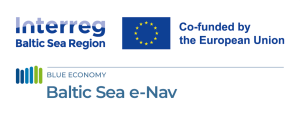
The CyberSEA project aims to improve maritime cybersecurity by identifying vulnerabilities and developing seafarers' awareness of the risks of cybersecurity in the maritime sector. The project will result in the establishment of remote laboratories and a virtual learning centre for web-based training modules. The project will pilot the delivery of training to maritime students and seafarers already working in the profession and will contribute to the dissemination of information to promote best practices.
The expected results of the CyberSEA project are:
- Increased awareness and skills on cyber security in the maritime sector
- Development of a cyber security training programme for the merchant marine industry
- Development of training of trainers to support cybersecurity training
- Establishment of a cybersecurity laboratory and centre for hands-on training opportunities
- Strengthening cyber security best practices in the maritime sector
Funding: ERASMUS+, KA220-VET - Cooperation partnerships in vocational education and training
Duration: 1.9.2023–31.8.2026
Project manager:Janne Lahtinen, janne.lahtinen@samk.fi
The project develops solutions to the problems and challenges on the labor market in the food sector, especially concerning the use of seasonal workforce and multicultural work environment. The project creates a systematic method of mutual development work, i.e. an operating model that enables the rapid and up-to-date gathering of knowledge needs, the exchange of information, and problem solving to improve the competence of food industry workers. The operating model refers to the activities of a regularly meeting food industry expert forum and the related network of experts, and to micro-trainings initiated for the target group of the project due to the impact of these activities. This will promote employment, increase well-being at work and improve productivity at work. The flexible education path to universities of applied sciences improves the attractiveness of the food sector as a career choice for young people and thus promotes the availability of experts in the future.
The main implementer of the project is Länsirannikon Koulutus Oy WinNova and other implementers are Satakunta University of Applied Sciences (SAMK) and Pyhäjärvi Institute foundation (PJI).
Funding: ESR+ 2021-2027 (80%)
Duration: 1.8.2024–28.2.2027
Project manager: Iina Virtanen, SAMK, iina.virtanen@samk.fi

The MARILAB project will establish a research laboratory at the Maritime Logistics Research Center, which will be established as a new solution for emission reductions. An investment in a simulator will be made in the research laboratory (investment project). During the MARILAB project, the simulator will be used for demonstrations on emission reduction and energy efficiency in key maritime logistics topics
Project name: Maritime Research Laboratory - MARILAB (development and investment project)
Funding: European Regional Development Fund ERDF, SAMK
Duration: 01.09.2023-31.08.2026
Project manager: Johanna Lainio, johanna.lainio@samk.fi


Although countries around the Baltic Sea are aware and have been working on reducing emissions of nutrients, hazardous substances, several priority hazardous substances and specific pollutants are still released to the environment through urban stormwater systems.
To tackle this common challenge, the MUSTBE project has been set up to:
- Develop digital and technical solutions for stormwater planning, and
- Disseminate information for stakeholders around the Baltic Sea on the ways how to improve the efficiency of the urban storm water treatment related to environmentally hazardous substances.
Funding: Interreg Central Baltic
Duration: 1.5.2023–30.4.2026
Project manager: Meri-Maaria Salo, meri-maaria.salo@samk.fi
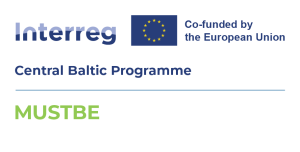
NEMO CEF (22-FI-TG-NEMO-EMSW)
In 2026, Finland will introduce a new maritime information management system, NEMO, which will be the national "single window" for maritime traffic reporting. From 2026 onwards, notification information will be automatically circulated in a single notification to all those who need it by law. NEMO is based on EU Regulation 2019/1239.
The NEMO CEF project will ensure the adequacy of resources for the implementation of the NEMO system and enable the implementation of value-added services. The NEMO CEF project will use pilot cases to study the impact of the implementation of the EMSW Regulation on a large scale, define key performance indicators, and test and validate the whole innovative process from start to finish for different actors. NEMO will be studied and developed from a sustainable development perspective.
Name of the project: N22-FI-TG-NEMO-EMSW NEMO project - Interoperable European Maritime Single Window environment implementation and deployment in Finland
Funding: European Commission, Connecting Europe Facility (CEF), SAMK
Duration: 01.07.2023-30.06.2026
Project manager: Minna Keinänen-Toivola, minna.keinanen-toivola@samk.fi

Sustainable Flow – Sustainable flow of goods and decreased CO2 emissions of transportation
The Sustainable Flow project contributes to the reduction of CO2 emissions through seven pilot ports in the Central Baltic area. The project will not only increase the knowledge of what individuals and organisations can do but will also develop practical tools for stakeholders. The goals and tangible outputs of the project are to develop 1) a digital tool for CO2 reduction and energy saving measures and 2) concept for energy savings and production of renewable energy in ports as hubs of multimodal operations.
Funding: Interreg Central Baltic
Duration: 1.5.2023–31.5.2026
Project manager: Mika Lindfors, mika.lindfors@samk.fi
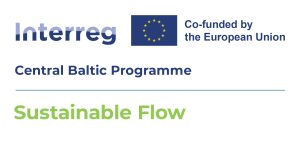
Completed projects
UUPO – New fuels for maritime logistics to boost green shift and blue growth in the Satakunta region
The project identified and increased the know-how of maritime logistics SMEs in the Satakunta region in the field of new fuels. The project researched the sustainable use of new fuels, using shipbuilding and port environments as examples. UUPO developed a web-based information package that focused on the needs and opportunities of the introduction of new fuels for maritime logistics SMEs in the region. The project contributed to the green transition and the blue economy of Satakunta's maritime logistics companies, taking into account the characteristics of the region.
Duration: 1.11.2022–31.12.2024
Funding: Regional Council of Satakunta
Project manager: Wili Helenius
More information on the project website.

DESSEV
The DESSEV project addressed issues related to the outbreak and possible spread of diseases on ships. The COVID-19 outbreak showed that in many places there are no mechanisms in place to deal with outbreaks – often existing procedures are not adapted to the surrounding reality. There is also a need to create completely new procedures.
Funding: Erasmus+
Duration: 1.11.2022–30.10.2024
Project manager: Janne Lahtinen, janne.lahtinen@samk.fi
More information from the project website.
Social skills in blended learning for better student achievement
Social skills in blended learning for better student achievement (Social blend) project aimed to raise awareness on the importance of social skills in blended learning. Social blend project gathered a library toolbox, that will provide background information and will provide teachers more knowledge on the importance of social skills or transversal skills in education and especially in online education. The teaching and learning toolbox will provide practical and simple tools aimed at raising teachers digital skills.
Duration: 1.1.2022 – 30.6.2024
Funding: Erasmus+ KA220-SCH
Project Manager: Iira Ostamo
ROME – Investigating the future of maritime workplace and role of marine engineers in autonomous ships
ROME project provided a comprehensive understanding of the role of marine engineers in the operation and maintenance of recently built new ships having new class notations such as Safe Return to Port (SRtP).
The project also provided a comprehensive understanding of the role of marine engineers in the operation and maintenance of future autonomous ships. ROME project helped MET institutes to take initiative and make plans for required competency developments
Duration: 1.5.2023–30.4.2024
Funding: International Association of Maritime Universities (IAMU)
Project manager: Heikki Koivisto, heikki.koivisto@samk.fi
SataMieLo
In SataMieLo (Ensuring productivity, work wellbeing and resiliency of SME’s and logistics chain operators of Satakunta in the changing world) project a concept for ensuring the work productivity and wellbeing to entrepreneurs and experts in SMEs in Satakunta is formulated.
Aims of the project
- Define the needs of companies and individuals as basis of the trainings. Formulate joint concept for the companies
- Organize series of training events and supervision of work
- Formulate a SataMielo concept on work wellbeing and improved resiliency, which suit to broad use in the sector. The target of the concept are entrepreneurs, managers and personnel.
- Formulate an online training tool from the material of training events and other developed training materials. The online training course is freely available during and after the project.
Funding: European Social Fund, ESR
Duration: 1.6.2021–31.12.2023
Project manager: Antti Värre, antti.varre@samk.fi
More information on SataMielo website.
RELAR – Remote learning and examination by using AR in maritime VET education
RELAR project aims to create a crisis-proof resilient maritime VET ecosystem by enabling remote learning and examination using Augmented Reality, AR. It addresses the key challenges of the maritime and port education ecosystem caused by structural change due to new digital technologies. It focuses on the adoption of AR tools to improve learning outcomes.
Financer: Erasmus+
Duration: 1.5.2021–30.9.2023
Project manager: Janne Lahtinen, janne.lahtinen@samk.fi
ÄlyMeri (Intelligent Maritime Logistics in Satakunta)
Project develops a risk management framework for logistical processes. The model improves the resiliency of logistic chains in Satakunta. The project highlights with pilot cases new technologies to improve efficiency and resiliency in logistical processes.
Funding: The Regional Council of Satakunta
Duration: 1.4.2021–31.3.2023
Project manager: Hanna Kajander, hanna.kajander@samk.fi
MeriLoki (Maritime Logistics Research Center with targeted actions provide maritime, logistics and security of supply expertise and growth for companies in Satakunta)
Project strengthens the operations of the Maritime Logistics Research Center and regional cooperation between the various parties in the logistics chain.
Financer: European Regional Development Fund,
Duration: 1.9.2021–30.8.2023
Project manager: Minna Keinänen-Toivola, minna.keinanen-toivola@samk.fi
Read more at the project's website.
LaivaDigiLab – Digital laboratory for pre-testing in ship building processes
- Mapping the current status of digital systems in shipbuilding processes
- Piloting pretesting of digital systems of LaivaDigiLab
- Developing the expert group on pretesting of shipbuilding processes in Satakunta, Finland
- Developing the concept of pre-testing digital lab “LaivaDigiLab”
Funding: EAKR, SAMK
Duration: 01.09.2020–31.08.2023
Project manager: Hanna Kajander, hanna.kajander@samk.fi
Read more at the project website.
KOS – Towards skillful Satakunta
Funding: Euroopean Social Fund
Duration: 1.1.2021–31.8.2023
Project manager: Marko Honkanen, marko.honkanen@samk.fi
AutoMare EduNet – Network of Autonomous Shipping
The project created a network for higher education in the maritime sector and the maritime industry.
The partners were Aalto University, Yrkeshögskolan Novia, South-Eastern Finland University of Applied Sciences, Turku University of Applied Sciences, University of Turku, Satakunta University of Applied Sciences and Åbo Akademi.
Financier: The Ministry of Education and Culture
Duration: 1.1.2021–30.6.2023.
Project manager: Peter Sandel, peter.sandell@samk.fi
Erasmus+ MERSol (Mersol Maritime Engine Room Simulator OnLine).
In MERSol, study modules and a new web-based application engine room simulators.
Financer: Erasmus+
Duration: 1.6.2021–30.5.2023
Project manager: Heikki Koivisto, heikki.koivisto@samk.fi
Read more at the project's website.
Praktik på svenska
The aim of the project was support the development of Swedish skills of higher education students in authentic work contexts, thus strengthening the employability of graduates in jobs in the social and health sector where Swedish skills are needed. The aim was that the model created in the network will create more traineeships and jobs for students in the social and health care sector. The aim was to create a multi-professional project with nursing, physiotherapy and social work teachers from Satakunta University of Applied Sciences (SAMK) and Swedish teachers, working together with Swedish-speaking partners in the social services sector. There has been no similar multi-professional cooperation in the past. The aim of the project was to create a network of cooperation with Swedish-speaking actors in the social and health sector. The network created and pilot a model for cooperation between Swedish-speaking partners and SAMK in order to organize work placements in the health and social services sector.
Funding: National funds and foundations
Duration: 11.10.2020–31.5.2023
Project manager: Merja Ahosmäki, merja.ahosmaki@samk.fi
KT Tekno – Building new skills in engineering and manufacturing
The aim of the project was to bring new skills to mechanical and production engineering. January 2022 started, the training was consist of four modules; project management, sustainable development, 3D modelling and production control. Each module included four five-credit courses at bachelor's degree level.
Funding: Ministry of Education and Culture
Duration: 1.2.2021–31.5.2023
Project manager: Iina Virtanen, iina.virtanen@samk.fi
MeriErko – Implementing specialised training in the maritime sector
The aim of the project was to implement specialized training in the maritime sector. The training was designed with the help of maritime trainers and was carried out once in cooperation with the Universities of Applied Sciences of the maritime sector and the Maritime Training and Research Center. The target group was unemployed persons and persons threatened with unemployment.
Funding: Ministry of Education and Culture
Duration: 1.4.2021–30.4.2023
Project manager: Riitta Tempakka, riitta.tempakka@samk.fi
IAMU – Simulation
IAMU – Simulation: Simulation Training Program for the Future Autonomous Ship Operators
Duration: 1.5.2022 – 31.3.2023
DAMOCLES
The COST Action DAMOCLES coordinated research activities within Europe to gain a better understanding of Compound Events. The complete plan of activities was provided in the Memorandum of Understanding (MoU).
DAMOCLES was a) identify key process and variable combinations underpinning Compound Events; b) describe the available statistical methods for modelling dependence in time, space, and between multiple variables; c) identify data requirements needed to document, understand, and simulate Compound Events, and d) propose an analysis framework to improve the assessment of Compound Events.
DAMOCLES bringed together climate scientists, impact modellers, statisticians, and stakeholders to better understand, describe and project Compound Events, and foresees a major breakthrough in future risk assessments.
Financer: European COST Action CA17109
Duration: 14.9.2018-12.3.2023
Read more at the project's website.
WECANet
COST WECANet (A pan-European network for marine renewable energy) was forming the first pan-European Network on an interdisciplinary marine wave energy approach, which was contribute to large-scale solutions. The WECANet Action aimed at a collaborative approach, as it provided a strong networking platform that also creates the space for dialogue between all stakeholders in wave energy.
Financer: COST European co-operation in science & technology
Timetable: 12.9.2018-11.3.2023
Read more at the project’s website.
ChangeMakers – Start-ups for sustainable environment created by youngsters
The project aimed to enhance sustainable development, cross-border collaboration and circular economy based entrepreneurship among students under the age of 18. Totally 250 students from Finland (inc. Åland), Sweden, Estonia and Latvia participated in solving real-life environmental challenges provided by business sector. As a response to these challenges, participating students created 50 mini company start-ups based on sustainable innovations and creativity. The project created a study model for secondary schools, as well as an open access e-learning tool called the ePlatform.
Funding: European Regional Development Fund
Duration: 1.3.2020-31.11.2022
Further information on the project website and ePlatform.
CBSmallPorts – Energetic Small Ports in the Central Baltic Region
In the Central Baltic area, several small ports have developed activities and investments regarding both safety and resource efficiency services. However, a common platform for information and marketing has been missing. CBSmallPorts gathered all the relevant information and all essential resources into one joint network. The aim was to collect the data on all the services for further marketing. Instead of different separate web apps, the project formulated a common online platform "Baltic Small Ports” combining the information for different audiences, such as boaters, other service users and small ports owner.
Funding: Interreg Central Baltic
Duration: 1.3.2020-30.11.2022
Further information on the project website.
SaLoDi – Digital steps of logistics chains in Satakunta
The SaLoDi project defined the current situation and possibilities to expand transport logistics chains in Satakunta within digitalization tools. The main themes were securing logistics of the security of supply, environmental friendliness, decreasing emissions, and effectiveness of operations for improved competition. A general concept for the time after the COVID-19 crisis was formed that ensures the competitiveness of the industry.
Financer: Regional Council of Satakunta
Duration: 1.4.2021-31.10.2022
Further information on the project website.
SataMaa – From the world to Satakunta and from Satakunta to the world
The main objective of the project was to identify the current state and desired state of public transport in the Satakunta region and to find a platform/application to implement a long-distance transport pilot in an automated, but customer- and operator-friendly way. The long-term objectives were to increase the accessibility and use of public transport and at the same time to increase accessibility, employment and tourism in Satakunta through public transport.
Funding: Regional Council of Satakunta, AKKE funding
Duration 1.4.2021-31.10.2022
SME Aisle
The objective of the project was to support Central Baltic maritime clusters’ SMEs with ambition and potential to enter into new markets in Southern Africa using Namibia as a stable entry point.
SME Aisle focused on companies from the Central Baltic area i.e. Finland (incl. Åland), Estonia, Latvia, and Sweden.
The themes were shipbuilding, maritime, renewable energy, automation, and ICT.
Read more at the project's website.
PROMETHEAS – Promoting Mental Health at Sea
Duration: 01.11.2019 - 31.8.2022
Funding: Erasmus+
The main aim of this project was to develop a training course and learning resources for seafarers and maritime workers concerning the preservation and improvement of their mental health. It focused on the various issues that derive from mental health problems and provided learners with necessary information and consultation on how to deal with these problems.
Read more on the project website.
Greenship – Towards Zero Ship Emissions
The Greenship project reviewed current practices in emissions reduction by shipping companies and formulated a generic course on how ships can reduce their harmful emissions and become also more efficient.
Read more on the project's website.
Bli proffs!
Duration: 1.10.2018 - 30.6.2022
Funding: Finnish foundations
The project Bli proffs! focused on developing a digital study module of Swedish together with work life partners.
Euro-ZA – Capacity building in the field of maritime education
Duration: 15.11.2018 - 31.7.2022
Euro-ZA was an international Erasmus + funded project for building more capacity in the field of maritime education.
ISTLAB – Intelligent Shipping Technology Test Laboratory
Duration: 1.1.2019 - 31.3.2022
Smart waterways, smart ports, remote piloting and the gradual phasing-in of remotely operated and autonomous ships represent a technological breakthrough, predicted to effect a revolution in the entire maritime cluster in the years and decades to come. The project created a smart joint-use Intelligent Shipping Technology test Laboratory, ISTLAB.
Further information on the project website.
AlusAkku – The electrical safety of ship batteries and electrical cars transported
Duration: 1.3.2021-28.2.2022
Funding: Ulla Tuominen foundation
Research themes:
- The current situation in ship battery systems.
- Technical and operational risks in ship battery systems and risk control measures.
- Main themes in service operations, evaluating the additional risk from electrical cars transported on ships.
Next Level
Duration: 1.4.2021 - 31.1.2022
The main goal of the project was to find solutions for the recruitment challenges of international high-skilled workforce the Satakunta region.
Efficient Flow
Duration: 1.3.2018 - 31.5.2021
Project's goal was to improve logistics and make the material and passenger flows between the two central Baltic Sea routes (ports between Gävle-Rauma and the Stockholm-Turku seaway) more efficient by utilizing the Sea Traffic Management (STM) system.
Read more at the project's website.
SataVarmuus
Duration: 01.07.2020 - 30.06.2021
The SataVarmuus project mapped Satakunta's security of supply expertise, increased the security of supply expertise of the area's operators, and created and launched the SataVarmuus network of experts.
Read more at the project's website.

